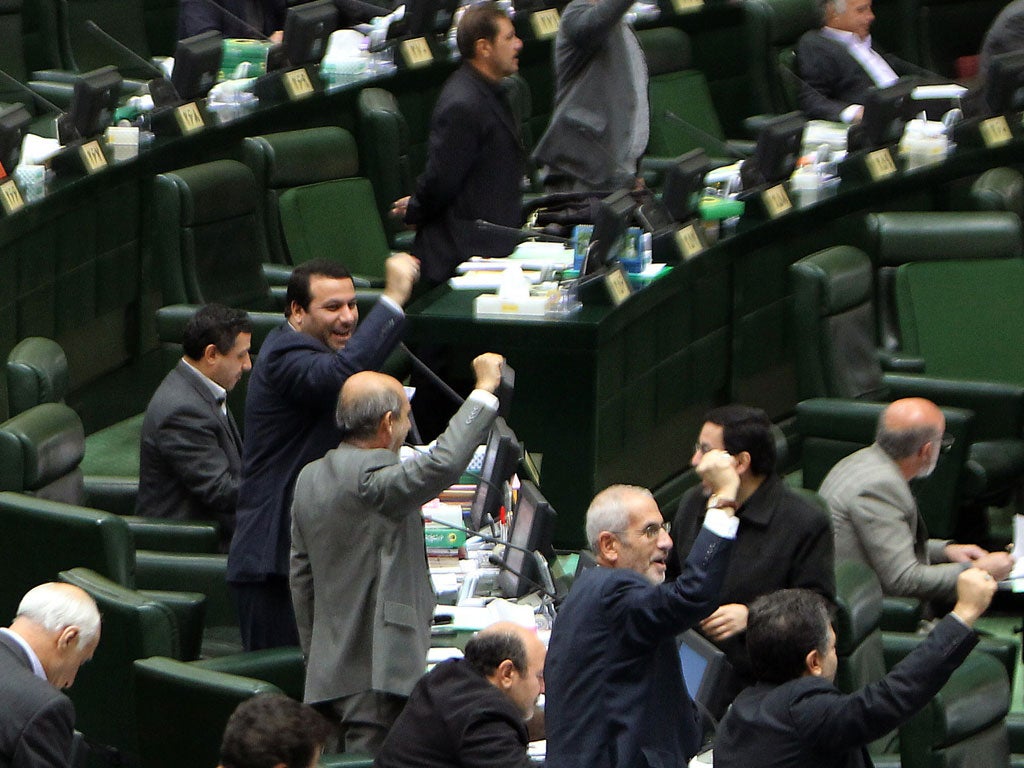Iranian MPs expel diplomat amid chants of 'Death to Britain'

Iran's parliament has called for drastic cuts in diplomatic ties with the UK in the escalating row over Tehran's alleged attempt to acquire a nuclear arsenal.
MPs chanting "death to Britain" voted for the withdrawal of both country's ambassadors in retaliation for the UK government's decision to follow the US in toughening sanctions following a critical report by the International Atomic Energy Agency (IAEA) into Iran's nuclear programme.
The motion, passed by 87 per cent of MPs, will need to be approved by the country's Guardian Council before it can come into effect. But the parliamentary speaker, Ali Larijani, seen as an influential figure in governing circles, said yesterday: "We are observing the behaviour of this country [Britain], and it is the beginning of the road – further measures may be taken." Another senior MP, Zohreh Elahian, accused the UK of having an "agenda of sedition aimed at toppling the Islamic Republic".
The British ambassador to Tehran, Dominick Chilcott, was only appointed last week. A Foreign Office spokesman said: "If the Iranian government acts on this, we will respond robustly in consultation with our international partners. This unwarranted move will do nothing to help the regime address its growing isolation, or international concerns about its nuclear programme and human rights record."
This was the latest example of Iran's increasingly hard-line stance against what it considers to be hostile acts by London. Earlier in October, the mayor of Tehran ordered a lawsuit to be filed contesting the ownership of the land on which Britain's embassy has stood since the 19th century. The previous month a group of people with supposed links to BBC's Farsi-language service were detained. There have also been charges of UK collusion with the opposition during the disputed elections in 2009.
But the row over claims that Tehran is attempting to manufacture nuclear arms has led to an escalation in punitive action by both sides. Last Tuesday, the Chancellor, George Osborne, announced the cutting off all UK financial ties with Iranian banks which, he claimed, were funding the nuclear programme. The move is also expected to have an impact on Iran's oil and petrochemical industries, the country's main source of revenue.
It will also affect trade between the two countries. In the first six month of 2011, Iran sold 11,000 barrels of crude to Britain per day, some 0.5 percent of Iran's daily production. British Midland International airline carries some 80,000 passengers between Tehran and London per year on its daily flight. Some 100,000 Iranians live in the UK.
The US and Canada announced similar sanctions, and the European Union will this week consider a French call for a ban on Iranian oil exports. However, Russia and China, which have been critical of some aspects of the IAEA report, have effectively blocked the possibility of the UN Security Council toughening its measures against Tehran.
Join our commenting forum
Join thought-provoking conversations, follow other Independent readers and see their replies
Comments
Bookmark popover
Removed from bookmarks